Sharon M. Draper's Blog
November 6, 2013
Interview with Kids Ebook Bestsellers
Sharon Draper: Two Books, Top Ten, Two Weeks in a Row.
 Sharon M. Draper is an award-winning (and prolific) author. She's also an educator, speaker, poet and National Teacher of the Year. On July 27th, her book Out of My Mind hit the number 2 spot in the Children's and Teen section of the Amazon Kindle store. The following week, on August 3,Copper Sun was #10 in the Juvenile section of EBooks.com. Today we'll focus on Out of My Mind.
Sharon M. Draper is an award-winning (and prolific) author. She's also an educator, speaker, poet and National Teacher of the Year. On July 27th, her book Out of My Mind hit the number 2 spot in the Children's and Teen section of the Amazon Kindle store. The following week, on August 3,Copper Sun was #10 in the Juvenile section of EBooks.com. Today we'll focus on Out of My Mind.First, tell us what your book is about.
In Out of my Mind, I have created a character who speaks for all of us, even though she cannot say a word. Melody has cerebral palsy, but she dares anyone to feel sorry for her. She understands her limitations, yet strives each day to reach beyond those limits. She can’t walk, can’t talk, can’t even go to the bathroom by herself. Yet she has a brilliant mind, a photographic memory, and dreams and desires of any of child her age. Her struggles and successes will both surprise and enchant the reader.
Tell us briefly about your path to publication: Traditional or independent? Recently or further in the past?
Out of my Mind is my thirtieth book. I have been very blessed. But I guess you can say it has taken me twenty years to become an overnight success! My first book, Tears of a Tiger, was rejected by twenty-four publishers. I had sent the manuscript to 25 publishers. The very last response was a yes! And it was Simon and Schuster. That was back in 1994. I've been writing and sharing books every since.
What top factors do you believe put your e-book where it is now?
I think the world of readers is changing. Most of my books are written for young people--teens and tweens--and those are the ones who most embrace the world of computers and smart devices and non-print communication. So they, of course, would be the ones to gravitate to ebooks and ereaders. I'm so glad the book is available in that format for them.
How are people finding out about your book? Tell us about your marketing and use of social media.
I've got a website I am in the process of re-doing it this summer, partly because I like to keep it fresh and current, and partly because the communication platforms have change so drastically. For example, my site could not be opened on my own iPad and other smart devcies. Hopefully, in the fall it will shine! I'm also on Facebook and Twitter..
What were your initial thoughts about e-publishing? Have those initial thoughts changed now that you’ve done it?
I am very excited about e-publishing. I guess I'm considered "old school" (LOL). I remember typewriters and writing with actual pen and pencil (gasp) on long yellow legal pads. I remember when it was a rare oddity to have a computer at a school and when movies were shown on an old-fashioned sixteen millimeter projector. We listened to music on a record player. There was no such thing as a cell phone or a microwave or an ipad or ipod. And certainly no e-readers. There was no e-anything! But I embraced every change, bought every new device, and kept up with every advancement. So, yes, I'm ready for e-publishing, and for whatever comes next as well!
As you got into e-publishing, have you discovered unexpected things? Has anything happened that you wouldn’t have predicted?
I guess the unexpected part was the success and the increased vastness of the audience. I've received emails from readers all over the world who have read Out of my Mind and loved the book. Those readers might not have found the book in their local bookstore. But through their various digital devices, they can access the book with just a fingertip I like that.
Is your book available in print format?
Yes, Out of my Mind is available in print, as are all of my books. I am very proud to say that Out of my Mind has been on the New York Times Bestseller List for almost a whole year! What a blessing!
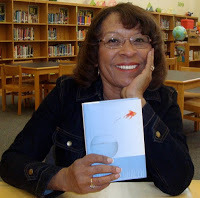 Do you think e-publishing will eventually take over print publishing? Why or why not?
Do you think e-publishing will eventually take over print publishing? Why or why not? Like I said, I'm old school. I never want to lose books. I love the smell of a book in my hand, the feel of a page as I turn it, the memories evoked by a glance at the cover. I don't want to lose libraries and bookstores. They are vital to our sense of connection and community. I love sitting in a library and inhaling all the knowledge there as I peruse a real book. I love sitting in a bookstore surrounded by real books as I read on a quiet Sunday afternoon. I think traditional print books will always be around. I think the two formats can co-exist. They must. Both are essential.
Do you believe the e-format helps or hurts you as an author? How?
I really don't know enough yet to answer that question. But a thirteen-year-old aspiring writer once said to me, "I want to be a writer when I grow up. Will there still be books? Will people still read?" She could see the changes and wasn't sure how she would fit into the future. I told her, "There will always be a need for stories to be told, and a need for a person to write those stories. So yes, you can be a writer. The format may change, but the need for knowledge and literary involvement will never go away."
Do you believe the e-format helps or hurts your readers, specifically children and/or young adults? How?
I have a five year old grandson who can find things on his iPad that I cannot. He helps me when I get stuck! He reads traditional books as well as ebooks. Instead of using paper and pencil materials, he learns numbers and letters and colors and such on various e-devices. He is comfortable with both worlds. He will grow up knowing and using both. I imagine most kids of his generation will do the same.
http://www.kidsebookbestsellers.com/2...
Published on November 06, 2013 10:06
March 23, 2013
Panic Q&A
1. In PANIC, you discuss the difficult issues of abusive teen relationships as well as the dancers of lurking pedophiles. Why do you deal with such dark issues?
I try to give a voice to teens who might be afraid to speak up about difficult relationships, and a warning to those who think they are “too smart” to be lured by a slick talking adult whose aim was to take advantage of them. My characters can undergo difficult situations so that my readers might not have to.
2. How would you compare or contrast the relationships of the two girls caught in relationships they felt helpless to escape from?
Although Layla’s situation was of her own choosing, and Diamond’s circumstance was very much against her will, both girls were caught by the strength and manipulation of a more dominant person. Both girls needed to find escapes from their situations through their own personal strengths. Good friends play an important role in their ultimate survival.
3. What lessons do you hope to teach young women about growing up female, and how do you think the characters in the book can help girls make healthy choices about their lives.
Teenaged girls today need strong, positive role models that can show them how to be independent thinkers and confident decision-makers. Diamond is proud and self-confident, which is good, but she made a deadly decision which changed her life forever. Layla also became involved in difficult situations that could have been handled better. The other girls—Mercedes, Jillian, even Zizi, all serve as important backdrops to the lives of the girls in jeopardy. I would hope that a young woman can read the book, discuss the actions of the characters, and reflect on the decision-making in her own life.
4. How does the character of Justin figure in the lives of the rest of the girls in the dance studio. What lessons can young men get from reading the book?
Justin is a picture of strength, positive attitude under stress, and determination. He has enough self confidence to fight for his own dreams, both on the dance floor, and with Layla. He is a role model to the girls he works with, and becomes the beacon of light for the girl he cares about. I would hope that a young man would read the book and reflect on the decision-making in his own life.
5. What is the role of dance and music in the book?
Dance and music swirl throughout the novel as colorful backdrops to the story. Dance helps both Diamond and Layla work through the demons in their lives, and it gives the other characters the strength to continue during days of difficulty. The characters’ love for dance and music helps them express complicated feelings and emotions. When they dance, they are more than the pieces of their lives—they are whole. I strongly encourage young people to find a musical or creative outlet, for creativity is what helps us see the beauty in life.
6. What is the significance of the role of Miss Ginger in the novel?
Teachers are often the only people a teenager can talk to or confide in. They provide support, encouragement, guidance, and sometimes just plain common sense. Miss Ginger, since she is not an academic teacher at school, is available to her students on a different level and therefore is even more important in their lives. She offers music, dance, escape from the problems of life, and a strong shoulder to depend on.
7. What was the inspiration for this story? Why do you use quotes from Peter Pan at the beginning of each chapter?
I remember watching performances of Peter Pan as a child. Although most of us think of it as a delightful children’s tale, it is really a harsh story of someone who sneaks into a bedroom at night and steals three children! It is really an abduction story. As an adult and a parent, I’d be putting out an Amber Alert for those children. My tale of abduction, although very different from the Peter Pan story, has the children’s tale of Peter Pan as the backdrop as the students in the dance academy prepare for a performance of it.
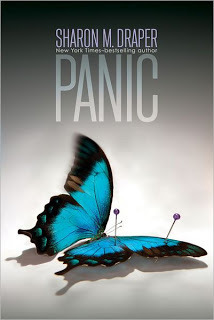
For more information, check out my website.
Published on March 23, 2013 14:51
March 8, 2013
YOU ARE INVITED!!

On March 9 and 10, at the Ormond Beach Performing Arts Center, in Daytona Beach, Florida, Kinetic Expressions Dance Academy, the studio on which the novel PANIC is based, will perform a lively and creative dance version of Peter Pan.
Directed and choreographed by Ms. Crystal Draper, the owner of KEDA, the show will be powerful. Come and see the inspiration for the novel! For more information, call 386-882-KEDA or visit dancekeda.com or facebook.com/kedadance.

Published on March 08, 2013 08:08
March 6, 2013
The Characters In Panic
- Diamond, who cannot escape from her abusive captors.
- Justin, who loves the passion of dance and yearns for Layla.
- Layla, who is blind to her own beauty and self worth.
- Mercedes, who is overwhelmed by guilt, anger, and fear.
When they dance, they are more than the pieces of their lives--they are whole.

- Justin, who loves the passion of dance and yearns for Layla.
- Layla, who is blind to her own beauty and self worth.
- Mercedes, who is overwhelmed by guilt, anger, and fear.
When they dance, they are more than the pieces of their lives--they are whole.

Published on March 06, 2013 11:43
March 4, 2013
The Story Behind Panic
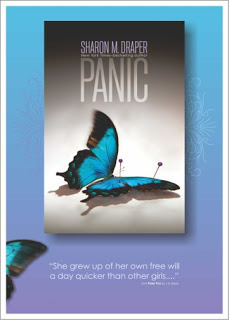 Several years ago I read an article about two girls, ages 14 and 15, who were abducted from a mall by a man who promised them jobs in the modeling profession. They got into his car voluntarily, thinking probably of being proud of making a sound, adult career decision. It was six months before they were able to escape their captor. Teen abductions in this country often are not reported because it is assumed that the teen simply ran away. Look at any missing teen website and you'll see the faces of young people who are yearning to be found.
Several years ago I read an article about two girls, ages 14 and 15, who were abducted from a mall by a man who promised them jobs in the modeling profession. They got into his car voluntarily, thinking probably of being proud of making a sound, adult career decision. It was six months before they were able to escape their captor. Teen abductions in this country often are not reported because it is assumed that the teen simply ran away. Look at any missing teen website and you'll see the faces of young people who are yearning to be found. And although most of us think of Peter Pan as a delightful children's tale, it is really a harsh story of someone who sneaks into a bedroom at night and steals three children! It's an abduction worthy of an Amber Alert. So in Panic, I used Peter Pan as the backdrop as students in a dance academy prepare for a performance of it.
On my website, I posted a Q&A on Panic.
Published on March 04, 2013 07:57
March 1, 2013
Panic To Be Released March 12!!
 Panic
is an edgy novel, full of urgency and passion. Fifteen-year-old Diamond, trying to show her mother she knows how to make an "adult decision", makes a tragic mistake instead. She disappears from a local mall, and no one can find her.
Panic
is an edgy novel, full of urgency and passion. Fifteen-year-old Diamond, trying to show her mother she knows how to make an "adult decision", makes a tragic mistake instead. She disappears from a local mall, and no one can find her.Weaving together music, movement, and bits of the original Peter Pan story, the novel reveals a powerful tale of two dangerous and desperate relationships that have been marred by manipulation, cruelty and pain.
Powerful dance scenes, set to contemporary music and songs, swirl throughout the story.The pulse of the beat, the rhythm of the music, and the joy of creative movement help the characters express their complicated feelings and emotions as they work through the demons in their lives to find peace.
Published on March 01, 2013 10:55
February 12, 2013
This is Margaret. She is the NATIONAL winner of the conte...
This is Margaret. She is the NATIONAL winner of the contest called Letters about Literature. It is sponsored by the Center for the Book of the Library of Congress and is one of the most prestigious awards for young writers in this country. Students write letters to the authors of their favorite books. The letters are then judged on a local, then state, then national level. Margaret, who is from Arkansas, wrote her letter to me about Out of My Mind. It is beautifully written, and I wept when I read it. I am so very proud of Margaret, and so very humble that she chose to write so eloquently about Out of My Mind. I got to meet her as well. Here, in its entirety, is her winning essay, plus a picture of the day we met.
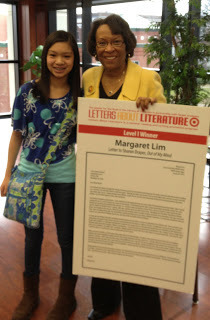 Dear Sharon Draper,A lot of books have flashes of insight, but only few of them have those bursts of fireworks that snap open the reader’s mind and make them realize something new. Your book, Out of My Mind, filled me with those sparks. Although your book is just another story out of the billion others out there, it meant more than “just another story” to me. I enjoyed getting to know Melody. Despite the fact that she had cerebral palsy, Melody had an amazing character that shone brightly. Out of My Mind helped me learn a life-long lesson.Your book has changed my point of view. I never teased those who had special needs, but I never really felt comfortable around them either. When I started reading your novel, I saw how Melody was a smart and talented girl. At the beginning of the book, I asked myself, “Would I be Melody’s friend?” The weird feeling in the pit of my stomach told me the sad truth: no. I carried on with your book from start to finish, and when I closed it, I asked myself the same question, “Would I be Melody’s friend?” I realized, with a grin, that the answer was right in front of me. Throughout Out of My Mind, I had become Melody’s friend. Her thoughts became my own. When her quiz team left her behind when it was time for them to travel for their competition, I felt angry. How could they? I then remembered that only a few weeks before, I would most likely do the same thing as Melody’s teammates. Her teammates showed me what not to do, because when they left Melody, they left me, and I did not like the feeling of being left behind.As I read and read, Melody’s thoughts and feelings melted easily into my brain like an ice cube on a sidewalk on a hot summer’s day. I have read other books about people with special needs and how they were treated unfairly, but the setting was always in the past. By putting the story in present day, I saw how people with disabilities are still treated with unkindness and how some people still act as if people with special needs are at the bottom of the feeding chart. I feel guilty about my previous thoughts. Melody is my inspiration. I have no idea how she dealt with her disabilities so well. In public, I am not a talker, but at home, I am a chatterbox. If I couldn’t talk, I would blow. Melody had the electronic talker, but it didn’t allow her to communicate fully. Even when she could “speak” her mind, it was still hard for others to understand how she truly felt.Before I read Out of My Mind, I used to wonder how people with special needs thought. It’s hard to confess, but I thought that they were less intelligent. Judging on the person’s disabilities clouded my mind, and I formed misguided conclusions about them. Last year, there was a boy in my class who had Asperger’s syndrome. I didn’t really know him; he just seemed different to me. Later on in the year, we happened to get seated in the same group. This was around the time that I read your novel. I got to know him and see what he was really like. Melody showed me how she was just as good as anyone else in her classroom and how the same goes for anyone else with disabilities. The boy in my class amazed me by what he was capable of doing. As the days went by, I started helping him instead of avoiding him.Melody opened my eyes and cleared the world around me. She showed me how a girl with cerebral palsy is the same as a girl like me. Once I learned from my mistake, I started to fix it, like with the boy in my class. Now it is time for me to thank you for writing this amazing novel. I will never forget your fantastic book. I don’t think anyone could. If they did, they would be out of their minds.Sincerely,Margaret Lim
Dear Sharon Draper,A lot of books have flashes of insight, but only few of them have those bursts of fireworks that snap open the reader’s mind and make them realize something new. Your book, Out of My Mind, filled me with those sparks. Although your book is just another story out of the billion others out there, it meant more than “just another story” to me. I enjoyed getting to know Melody. Despite the fact that she had cerebral palsy, Melody had an amazing character that shone brightly. Out of My Mind helped me learn a life-long lesson.Your book has changed my point of view. I never teased those who had special needs, but I never really felt comfortable around them either. When I started reading your novel, I saw how Melody was a smart and talented girl. At the beginning of the book, I asked myself, “Would I be Melody’s friend?” The weird feeling in the pit of my stomach told me the sad truth: no. I carried on with your book from start to finish, and when I closed it, I asked myself the same question, “Would I be Melody’s friend?” I realized, with a grin, that the answer was right in front of me. Throughout Out of My Mind, I had become Melody’s friend. Her thoughts became my own. When her quiz team left her behind when it was time for them to travel for their competition, I felt angry. How could they? I then remembered that only a few weeks before, I would most likely do the same thing as Melody’s teammates. Her teammates showed me what not to do, because when they left Melody, they left me, and I did not like the feeling of being left behind.As I read and read, Melody’s thoughts and feelings melted easily into my brain like an ice cube on a sidewalk on a hot summer’s day. I have read other books about people with special needs and how they were treated unfairly, but the setting was always in the past. By putting the story in present day, I saw how people with disabilities are still treated with unkindness and how some people still act as if people with special needs are at the bottom of the feeding chart. I feel guilty about my previous thoughts. Melody is my inspiration. I have no idea how she dealt with her disabilities so well. In public, I am not a talker, but at home, I am a chatterbox. If I couldn’t talk, I would blow. Melody had the electronic talker, but it didn’t allow her to communicate fully. Even when she could “speak” her mind, it was still hard for others to understand how she truly felt.Before I read Out of My Mind, I used to wonder how people with special needs thought. It’s hard to confess, but I thought that they were less intelligent. Judging on the person’s disabilities clouded my mind, and I formed misguided conclusions about them. Last year, there was a boy in my class who had Asperger’s syndrome. I didn’t really know him; he just seemed different to me. Later on in the year, we happened to get seated in the same group. This was around the time that I read your novel. I got to know him and see what he was really like. Melody showed me how she was just as good as anyone else in her classroom and how the same goes for anyone else with disabilities. The boy in my class amazed me by what he was capable of doing. As the days went by, I started helping him instead of avoiding him.Melody opened my eyes and cleared the world around me. She showed me how a girl with cerebral palsy is the same as a girl like me. Once I learned from my mistake, I started to fix it, like with the boy in my class. Now it is time for me to thank you for writing this amazing novel. I will never forget your fantastic book. I don’t think anyone could. If they did, they would be out of their minds.Sincerely,Margaret Lim
 Dear Sharon Draper,A lot of books have flashes of insight, but only few of them have those bursts of fireworks that snap open the reader’s mind and make them realize something new. Your book, Out of My Mind, filled me with those sparks. Although your book is just another story out of the billion others out there, it meant more than “just another story” to me. I enjoyed getting to know Melody. Despite the fact that she had cerebral palsy, Melody had an amazing character that shone brightly. Out of My Mind helped me learn a life-long lesson.Your book has changed my point of view. I never teased those who had special needs, but I never really felt comfortable around them either. When I started reading your novel, I saw how Melody was a smart and talented girl. At the beginning of the book, I asked myself, “Would I be Melody’s friend?” The weird feeling in the pit of my stomach told me the sad truth: no. I carried on with your book from start to finish, and when I closed it, I asked myself the same question, “Would I be Melody’s friend?” I realized, with a grin, that the answer was right in front of me. Throughout Out of My Mind, I had become Melody’s friend. Her thoughts became my own. When her quiz team left her behind when it was time for them to travel for their competition, I felt angry. How could they? I then remembered that only a few weeks before, I would most likely do the same thing as Melody’s teammates. Her teammates showed me what not to do, because when they left Melody, they left me, and I did not like the feeling of being left behind.As I read and read, Melody’s thoughts and feelings melted easily into my brain like an ice cube on a sidewalk on a hot summer’s day. I have read other books about people with special needs and how they were treated unfairly, but the setting was always in the past. By putting the story in present day, I saw how people with disabilities are still treated with unkindness and how some people still act as if people with special needs are at the bottom of the feeding chart. I feel guilty about my previous thoughts. Melody is my inspiration. I have no idea how she dealt with her disabilities so well. In public, I am not a talker, but at home, I am a chatterbox. If I couldn’t talk, I would blow. Melody had the electronic talker, but it didn’t allow her to communicate fully. Even when she could “speak” her mind, it was still hard for others to understand how she truly felt.Before I read Out of My Mind, I used to wonder how people with special needs thought. It’s hard to confess, but I thought that they were less intelligent. Judging on the person’s disabilities clouded my mind, and I formed misguided conclusions about them. Last year, there was a boy in my class who had Asperger’s syndrome. I didn’t really know him; he just seemed different to me. Later on in the year, we happened to get seated in the same group. This was around the time that I read your novel. I got to know him and see what he was really like. Melody showed me how she was just as good as anyone else in her classroom and how the same goes for anyone else with disabilities. The boy in my class amazed me by what he was capable of doing. As the days went by, I started helping him instead of avoiding him.Melody opened my eyes and cleared the world around me. She showed me how a girl with cerebral palsy is the same as a girl like me. Once I learned from my mistake, I started to fix it, like with the boy in my class. Now it is time for me to thank you for writing this amazing novel. I will never forget your fantastic book. I don’t think anyone could. If they did, they would be out of their minds.Sincerely,Margaret Lim
Dear Sharon Draper,A lot of books have flashes of insight, but only few of them have those bursts of fireworks that snap open the reader’s mind and make them realize something new. Your book, Out of My Mind, filled me with those sparks. Although your book is just another story out of the billion others out there, it meant more than “just another story” to me. I enjoyed getting to know Melody. Despite the fact that she had cerebral palsy, Melody had an amazing character that shone brightly. Out of My Mind helped me learn a life-long lesson.Your book has changed my point of view. I never teased those who had special needs, but I never really felt comfortable around them either. When I started reading your novel, I saw how Melody was a smart and talented girl. At the beginning of the book, I asked myself, “Would I be Melody’s friend?” The weird feeling in the pit of my stomach told me the sad truth: no. I carried on with your book from start to finish, and when I closed it, I asked myself the same question, “Would I be Melody’s friend?” I realized, with a grin, that the answer was right in front of me. Throughout Out of My Mind, I had become Melody’s friend. Her thoughts became my own. When her quiz team left her behind when it was time for them to travel for their competition, I felt angry. How could they? I then remembered that only a few weeks before, I would most likely do the same thing as Melody’s teammates. Her teammates showed me what not to do, because when they left Melody, they left me, and I did not like the feeling of being left behind.As I read and read, Melody’s thoughts and feelings melted easily into my brain like an ice cube on a sidewalk on a hot summer’s day. I have read other books about people with special needs and how they were treated unfairly, but the setting was always in the past. By putting the story in present day, I saw how people with disabilities are still treated with unkindness and how some people still act as if people with special needs are at the bottom of the feeding chart. I feel guilty about my previous thoughts. Melody is my inspiration. I have no idea how she dealt with her disabilities so well. In public, I am not a talker, but at home, I am a chatterbox. If I couldn’t talk, I would blow. Melody had the electronic talker, but it didn’t allow her to communicate fully. Even when she could “speak” her mind, it was still hard for others to understand how she truly felt.Before I read Out of My Mind, I used to wonder how people with special needs thought. It’s hard to confess, but I thought that they were less intelligent. Judging on the person’s disabilities clouded my mind, and I formed misguided conclusions about them. Last year, there was a boy in my class who had Asperger’s syndrome. I didn’t really know him; he just seemed different to me. Later on in the year, we happened to get seated in the same group. This was around the time that I read your novel. I got to know him and see what he was really like. Melody showed me how she was just as good as anyone else in her classroom and how the same goes for anyone else with disabilities. The boy in my class amazed me by what he was capable of doing. As the days went by, I started helping him instead of avoiding him.Melody opened my eyes and cleared the world around me. She showed me how a girl with cerebral palsy is the same as a girl like me. Once I learned from my mistake, I started to fix it, like with the boy in my class. Now it is time for me to thank you for writing this amazing novel. I will never forget your fantastic book. I don’t think anyone could. If they did, they would be out of their minds.Sincerely,Margaret Lim
Published on February 12, 2013 12:31
Wonderful Reviews for Out Of My Mind. Thank you!
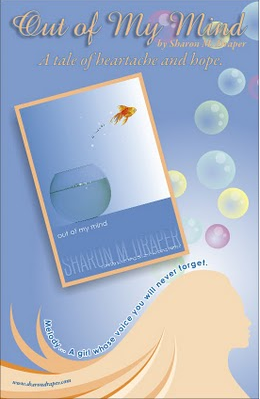
I can't remember the last time I was so emotionally overwhelmed by a middle grade novel. Sharon Draper's new novel is the story of Melody, a 10 year old girl with Cerebral Palsy so severe that she can neither speak nor move independently. Trapped inside Melody's uncooperative body is a brilliant mind with a cutting wit.
Melody is relegated to a classroom of special needs kids because she can't communicate what is going on in her head. Her world suddenly opens up when she gets a computer with a voice program that allows her to speak for the first time. Unfortunately, the rest of the school is not ready to accept Melody.
I was silently cheering for Melody while I read this book as I sat at my kitchen table. The conversations she has with her parents and caregivers about being different are gut-wrenching. Melody knows exactly how she is perceived by other kids and adults, including teachers. The conversations between Melody's parents as they contemplate the birth of their second child moved me to tears.
This is more than a book about a girl with special needs. It holds up a mirror for all of us to see how we react to people with disabilities that make us uncomfortable.
I encourage everyone to read this.
Susan Aikens, Kids Book Buyer from Borders Head Office
BOOKLIST, 1/1/10, STAR
What would you do if you could not make yourself known, if you had thoughts you could not speak? That is narrator Melody Brooks's plight:
"By the time I was two, all my memories had words, and all my words had meanings. But only in my head," she writes. "I have never spoken one single word. I am almost eleven years old." This is her story, and also the story of a loving family and their devoted neighbor, who help Melody along on her path to say what she needs to say.
Sharon Draper (Copper Sun; Forged by Fire), who herself has a child with cerebral palsy--though she explicitly states that this is not her daughter's story--inhabits the brilliant, frustrated mind and unresponsive body of this child. This is the kind of book--like Terry Trueman's Stuck in Neutral or Harriet McBryde Johnson's Accidents of Nature--that makes readers aware of their own biases, and of what a great disservice those biases do to human beings whose outer trappings belie an extraordinary intelligence within. Draper's book is distinctive for the way she traces Melody's journey and her attempts to communicate from as far back as she can remember. In often poetic language, Melody describes how early on she "began to recognize noises and smells and tastes. The whump and whoosh of the furnace coming alive each morning.
The tangy odor of heated dust as the house warmed up." The author smoothly structures the book in a way that builds suspense while also creating a fuller picture of Melody's daily life. One chapter discusses obstacles from the medical community. At age five, Mrs. Brooks takes Melody to a doctor who says that Melody is "severely brain-damaged and profoundly retarded." Mrs. Brooks defends Melody's intelligence to him ("She laughs at jokes... right at the punch line") and, in another chapter describing Melody's life at school, stands up to a teacher who also underestimates her daughter's mental acuity.
A turning point occurs during one of Melody's daily after-school stays with next-door neighbor Mrs. Violet Valencia ("Mrs. V"): she and six-year-old Melody happen upon a documentary about Stephen Hawking.
"Melody, if you had to choose, which would you rather be able to do--walk or talk?" asks Mrs. V. "Talk. Talk. Talk," Melody answers, by repeatedly pointing at the word on her communication board. This begins Melody's quest to find the tools to express herself--first with word cards she makes with Mrs. V, then with phrases and, finally, with an electronic Medi-Talker. Melody takes charge of her own education and her means of communication. She thrives in her "inclusion classes" with the mainstream students academically, but is not accepted by them socially.
Even the most compassionate classmate can fall to peer pressure, as Melody learns on the brink of her greatest achievement on the Whiz Kids quiz team. Melody sees clearly the challenges before her, and it is the source of her greatest heartbreak but also her greatest inspiration.
It's impossible to close this book without thinking about the world differently.--Jennifer M. Brown
Published on February 12, 2013 09:03
Out Of My Mind--Great blog review!
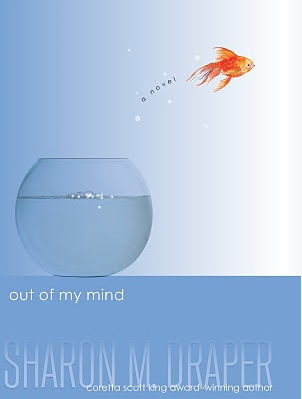 Title: Out of My Mind
Title: Out of My MindAuthor: Sharon Draper
Release: March 9, 2010
Publisher: Atheneum
Isbn:141697170X (isbn13: 9781416971702)
From blog: eatingyabooks.blogspot.com by Jan Von Harz
Imagine not being able to talk, walk, feed yourself, or take yourself to the bathroom. A real nightmare right? In Sharon Draper’s new book Out of My Mind this nightmare is a reality for eleven-year-old Melody. Born with cerebral palsy, Melody’s mind is filled with words and thoughts she can never express, but Draper’s beautiful and richly detailed prose gives Melody a harmoniously distinct voice impossible to forget. Listen...
Words.
I’m surrounded by thousands of words. Maybe millions.
Cathedral, Mayonnaise. Pomegranate.
Mississippi. Neapolitan. Hippopotamus.
Silky. Terrifying. Iridescent.
Tickle. Sneeze. Wish. Worry.
Words have always swirled around me like snowflakes—each one delicate and different, each one melting untouched in my hands.
Deep within me, words pile up in huge drifts. Mountains of phrases and sentences and connected ideas. Clever expressions. Jokes. Love songs.
From the time I was really little—maybe just a few months old—words were like sweet, liquid gifts, and I drank them like lemonade. I could almost taste them. They made my jumbled thoughts and feelings have substance. My parents have always blanketed me with conversation. They chattered and babbled. They verbalized and vocalized. My father sang to me. My mother whispered her strength into my ear.
Every word my parents spoke to me or about me I absorbed and kept and remembered. All of them.
I have no idea how I untangled the complicated process of words and thought, but it happened quickly and naturally. By the time I was two, all my memories had words, and all my words had meanings.
But only in my head.
I have never spoken one single word. I am almost eleven years old.
Using first person narrative Draper provides Melody a voice that is bright, witty, ingenious, and totally believable. I immediately formed a strong connection to Melody partially because of my own experiences working with an adolescent C.P. patient during my career as a nurse. However, the real connection is made because Draper’s characterization is so compelling. Within the first fifty pages, we learn first-hand a great deal about Melody’s life. She explains how she remembers everything she sees and hears, how much her mother and father love and care for her, how frustrating it is to not be able to express herself to those around her. “Nobody gets me. Nobody. It drives me crazy ... It’s like I live in a cage with no door and no key. And I have no way to tell someone how to get me out.”
When Melody’s mother enrolls her in school, Melody is hopeful that she will learn new things everyday. However, school becomes another source of frustration. Surrounded by other “special children” Melody is forced to endure doing the same things every year, “but with a new teacher.” Her experiences give new meaning to “dumbing down the curriculum.” Even her Plexiglass communication tray limits her abilities because it only provides “a handful of common nouns, verbs and adjectives ... and a few necessary phrases, like, I need to go to the bathroom, please and I’m hungry.”
Once Melody describes her first eleven years, the plot begins to truly develop. Melody becomes part of an inclusion program and begins to participate in “real” classroom experiences. Her physical limitations, however, remains a key source of frustrations and continues to define her in the eyes of her non-disabled classmates and regular ed. teachers. With the help of a classroom aide, her parents, and Ms V, a wonderful neighbor whose faith in her Melody is an inspiration, Melody’s imprisoned intellect is released when she receives a computer that talks and allows her to write. The Medi-Talker makes it possible for Melody to participate in classroom discussions and express her thoughts and feeling to her parents and friends without assistance. Sadly, her “regular” classmates and teachers remain skeptical of Melody’s true intellect.
Through Melody’s voice, Draper realistically portrays the insensitivity and discriminatory attitudes that disabled children encounter everyday without resorting to a preachy, bitter, or self-pitying tone. Melody’s perseverance despite overwhelming obstacles both from her physical limitations, and society's intolerance towards imperfections makes this book one of the most poignant and spiritually uplifting stories I have ever read. Melody’s conflicts are very real and the heartbreak she endures will bring tears to your eyes. I predict that Out of My Mind will be a 2010 award winner and is definitely going down as one of my all time favorite reads EVER!
Thanks so much, Jan!
Sharon D
Published on February 12, 2013 09:01
April 13, 2010
Wonderful Reviews for Out of my Mind. Thank You!
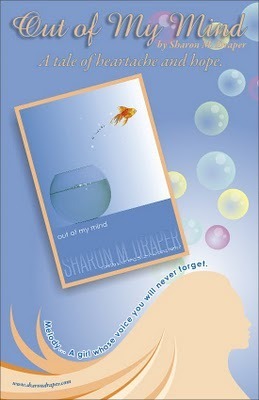
I can't remember the last time I was so emotionally overwhelmed by a middle grade novel. Sharon Draper's new novel is the story of Melody, a 10 year old girl with Cerebral Palsy so severe that she can neither speak nor move independently. Trapped inside Melody's uncooperative body is a brilliant mind with a cutting wit.
Melody is relegated to a classroom of special needs kids because she can't communicate what is going on in her head. Her world suddenly opens up when she gets a computer with ...
Published on April 13, 2010 05:57



